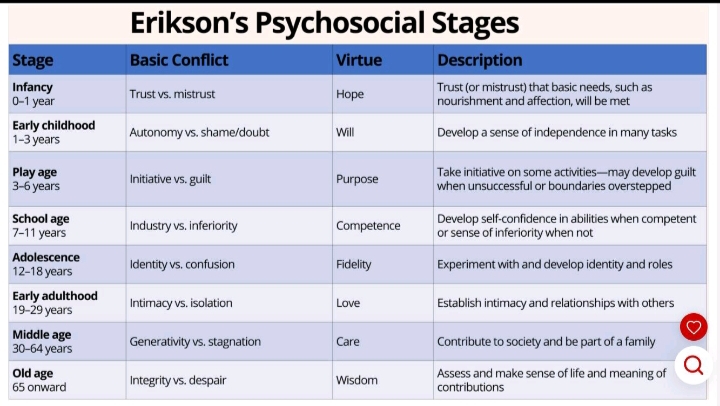What are Erikson's Psychosocial Stages?

Understand the Problem
The question is likely asking for a summary or explanation of Erikson's Psychosocial Stages, which describes the various stages of human development and associated conflicts. Understanding the basic conflicts, virtues, and descriptions at each stage can help grasp the theory of psychosocial development.
Answer
Erikson's 8 stages: Trust, Autonomy, Initiative, Industry, Identity, Intimacy, Generativity, Integrity.
Erikson's Psychosocial Stages are:
- Infancy (0-1 year): Trust vs. Mistrust - Hope
- Early Childhood (1-3 years): Autonomy vs. Shame/Doubt - Will
- Play Age (3-6 years): Initiative vs. Guilt - Purpose
- School Age (7-11 years): Industry vs. Inferiority - Competence
- Adolescence (12-18 years): Identity vs. Confusion - Fidelity
- Early Adulthood (19-29 years): Intimacy vs. Isolation - Love
- Middle Age (30-64 years): Generativity vs. Stagnation - Care
- Old Age (65+ years): Integrity vs. Despair - Wisdom
Answer for screen readers
Erikson's Psychosocial Stages are:
- Infancy (0-1 year): Trust vs. Mistrust - Hope
- Early Childhood (1-3 years): Autonomy vs. Shame/Doubt - Will
- Play Age (3-6 years): Initiative vs. Guilt - Purpose
- School Age (7-11 years): Industry vs. Inferiority - Competence
- Adolescence (12-18 years): Identity vs. Confusion - Fidelity
- Early Adulthood (19-29 years): Intimacy vs. Isolation - Love
- Middle Age (30-64 years): Generativity vs. Stagnation - Care
- Old Age (65+ years): Integrity vs. Despair - Wisdom
More Information
Erikson's theory emphasizes the impact of social experiences across the lifespan. Successfully resolving the conflicts leads to mastery of each stage's virtue.
Tips
A common mistake is misunderstanding the age range or the virtue associated with each stage.
Sources
- Erikson's Stages of Development - Verywell Mind - verywellmind.com
- Erikson Stages of Psychosocial Development - Simply Psychology - simplypsychology.org
- Erikson's stages of psychosocial development - Wikipedia - en.wikipedia.org
AI-generated content may contain errors. Please verify critical information